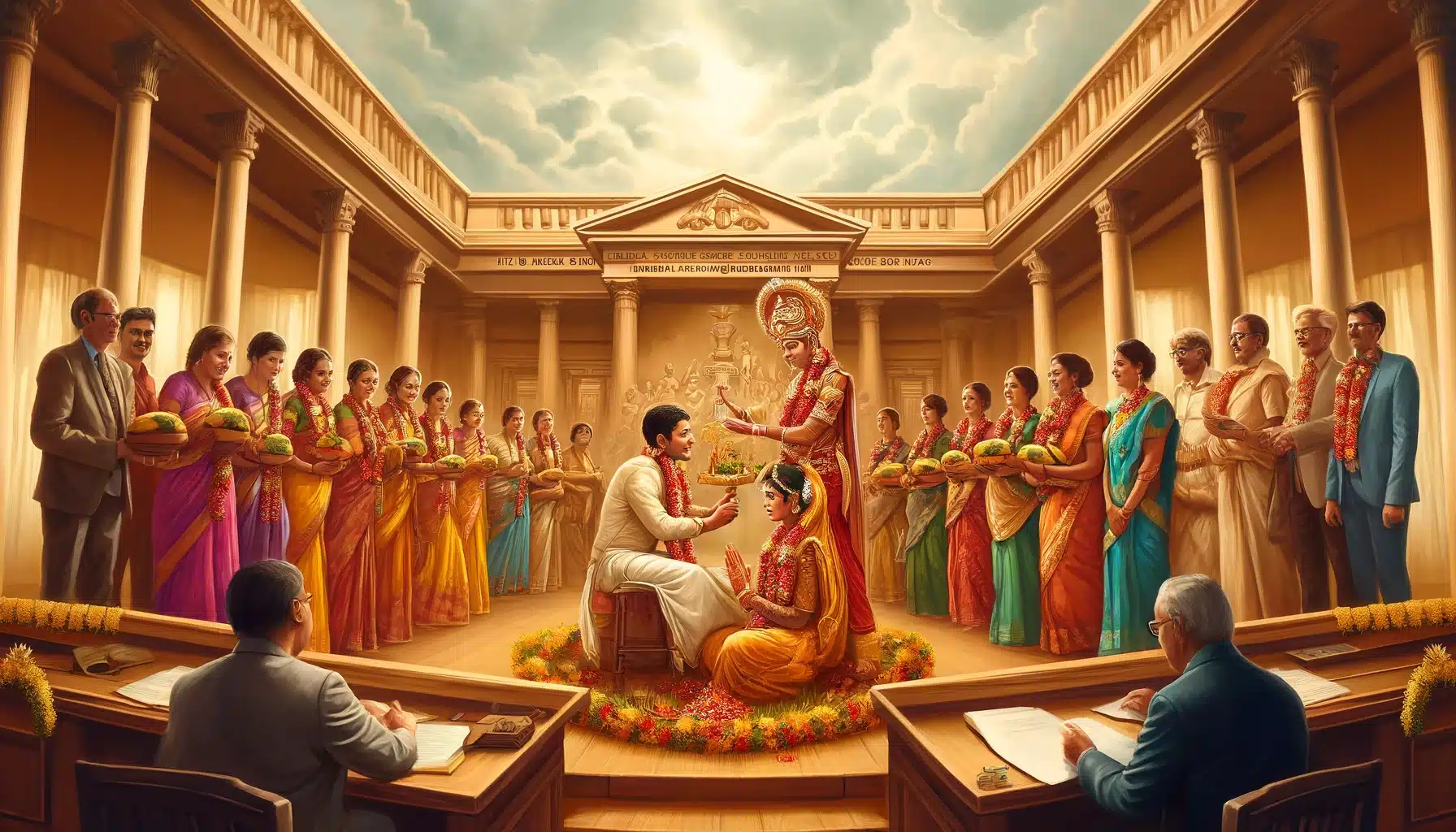Absence of “Saptapadi” did not invalidate the marriage.

Citation: (2001) 7 SCC 487
Date of Judgment: 31st August, 2001
Court: Supreme Court of India
Bench: D.P. Mohapatra (J) and K.G. Balakrishnan (J)
Facts
- Appellant married respondent on 6th September, 1970.
- Respondent left the marital home and started living with her parents due to physical and mental torture by husband.
- Later on, appellant married Kasturi on 18th June, 1984.
- Case was registered against appellant and six others.
Decision of the Lower Court
All were acquitted by the Metropolitan Magistrate. On appeal, Madras High Court upheld the acquittal of all accused except the appellant and remitted the matter to trial court permitting the complainant to adduce evidence regarding the manner in which the marriage was solemnized. After further examination and cross- examination, Metropolitan Magistrate acquitted the accused. On appeal, Madras High Court single judge bench held the appellant guilty u/s 494 IPC.
Key legal issues discussed
1. Whether ‘Saptapadi’ is an essential ritual to be performed in marriage under Hindu Law?
Yes
Court referred to cases like Priya Bala Ghosh v. Suresh Chandra Ghosh[1], Lingari Obulamma v. L. Venkata Reddy &Ors.[2] Santi Deb Barma v. Kanchan Prava Devi[3], Laxmi Deci v. Satya Narayan & Ors.[4], where it was established that “datta homa” and “saptapadi” are essential ceremonies that are to be performed for the solemnization of marriage under Hindu Law. Without these two essential ceremonies, there would not be a valid marriage.
2. Whether the second marriage on 18th June, 1984 was a valid marriage under Hindu Law so as to constitute an offence u/s 494 IPC?
Yes
As the parties to the second marriage were residents of Tamil Nadu and their marriage was performed within Tamil Nadu. So, court referred to Sec 7-A[5] which was inserted through State Amendment by the State of Tamil Nadu in the Hindu Marriage Act, 1955. Sec 7-A is a special provision regarding suyamariyathai and seerthiruththa marriages.
Section 7-A applies to any marriage between two Hindus solemnized in the presence of relatives, friends or other persons. The main thrust of this provision is that the presence of a priest is not necessary for the performance of a valid marriage. Parties can enter into a marriage in the presence of relatives or friends or other persons and each party to the marriage should declare in the language understood by the parties that each takes other to be his wife or, as the case may be, her husband, and the marriage would be completed by a simple ceremony requiring the parties to the marriage to garland each other or put a ring upon any finger of the other or tie a thali. Any of these ceremonies, namely garlanding each other or putting a ring upon any finger of the other or tying a thali would be sufficient to complete a valid marriage. Sub-section 2(a) of Section 7-A specifically says that notwithstanding anything contained in Section 7, all marriages to which this provision applies and solemnized after the commencement of the Hindu Marriage (Madras Amendment) Act, 1967 shall be good and valid in law. Sub-section 2(b) further says that notwithstanding anything contained in Section 7 or in any text, rule or interpretation of Hindu law or any custom or usage as part of that law in force immediately before the commencement of the Hindu Marriage (Madras Amendment) Act 1967, or in any other law in force immediately before such commencement or in any judgment, decree or order of any court, all marriages to which this section applies solemnized at any time before such commencement, shall be deemed to have been valid.
The evidence in the present case clearly shows that there was a valid marriage in accordance with the provisions of Section 7-A of the Hindu Marriage Act.
Decision of the Supreme Court
“Saptapadi” was held to be an essential ceremony for a valid marriage only in cases where it was admitted by the parties that as per the form of marriage applicable to them that was an essential ceremony. The appellant in the instant case, however, had no such case that “Saptapadi” was an essential ceremony for a valid marriage as per the personal law applicable whereas the provisions contained in Section 7-A are applicable to the parties. In any view of the matter, there was a valid marriage on 18.6.1984 between the appellant and the second accused, Kasturi. Therefore, it was proved that the appellant had committed the offence of bigamy as it was done during the subsistence of his earlier marriage held on 6.9.1970.
[1] (1971) 1 SCC 864.
[2] (1979) 3 SCC 80.
[3] (1991) Supp 2 SCC 616.
[4] (1994) 5 SCC 545.
[5] Hindu Marriage (Madras Amendment) Act, 1967 (Act 21 of 1967).


